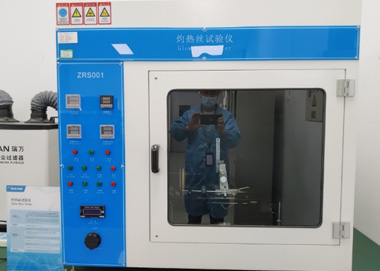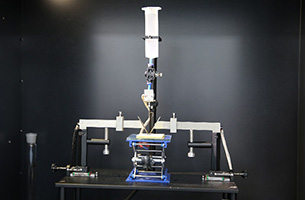Thermal shock test is used to determine the ability of the product to withstand the alternating shock of sharp changes of ambient temperature, and to judge whether physical damage or performance degradation occurs.
Temperature changes are common in the installation and use of products. Parts inside the equipment undergo slower changes of temperature than those on an external surface when the equipment is not switched on. Rapid changes of temperature may be expected:
1. When the equipment is transported from warm indoor environments into cold outdoor environment, or vice versa.
2. When the equipment is suddenly cooled by rainfall or immersion in cold water;
3. In externally mounted airborne equipment.
4. Under certain conditions of transportation and storage.
Test standards: GB/T 2423.22, IEC 60068-2-14, and GJB 150.5A-2009 are commonly used.
Test conditions: High temperature (70/85/125℃), low temperature (-40/-55/-65℃), duration of exposure (10min/30min/1h/2h/3h), transfer time (< 3min), and number of test cycles (5/10).

Test equipment:
The traditional thermal shock test is to place the product in two independent temperature test chambers, one for setting low temperature and the other for setting high temperature, using manual or automatic conversion method. The operation is much troublesome, and the larger test specimen is difficult to operate in this way.
Our company is equipped with two temperature shock chambers with super capacity, each of which contains three zones: high temperature zone, low temperature zone and test zone. The specimen is placed in the test area, and the damper in the high and low temperature zone is automatically switched through the program without human intervention. The internal dimensions of the test chambers are 1000mm*970mm*1000mm and 755mm*1200mm*1000mm respectively. Devices, PCBA, super-large machines and other products, almost all of our products (excluding cabinets) can be covered.


Product improvement:
1. Physical effect: It is able to judge the clamping or relaxation state of moving parts and structural connections such as fans. Different materials differ in the shrinkage and expansion rate or induced strain rate. Components and parts are deformed or broken. Blistering and cracking appear on the coating on the surface of the material. Sealed devices leak.

Chassis plastic deformation due to poor temperature resistance of materials Material with blistered surface
2. Piezoelectric effect: It is able to quickly detect the change of electronic components, and the electronic or mechanical failure caused by rapid condensate water or frosting.















 Facebook
Facebook
 Twitter
Twitter
 Google+
Google+
 LinkedIn
LinkedIn
 Prev
Prev








